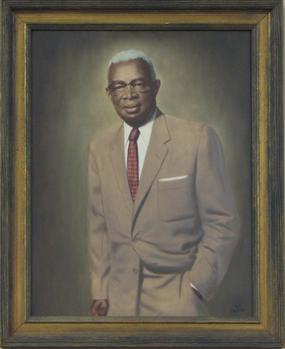Z. Alexander Looby facts for kids
Quick facts for kids
Z. Alexander Looby
|
|
|---|---|

Portrait of Z. Alexander Looby believed to be by E. Sebofield.
|
|
| Born | April 8, 1899 |
| Died | March 24, 1972 (aged 72) Nashville, Tennessee, U.S.
|
| Education | Howard University Columbia University New York University |
| Occupation | Lawyer |
| Political party | Republican |
| Parent(s) | John Alexander Looby Grace Elizabeth Joseph |
Zephaniah Alexander Looby (born April 8, 1899 – died March 24, 1972) was an important lawyer in Nashville, Tennessee. He worked hard for the civil rights movement in the United States. He was born in the British West Indies and moved to the U.S. when he was 15 years old.
Looby studied at several universities, including Howard University and Columbia University. He became a lawyer and taught at Fisk University in Nashville. He is famous for helping Black Americans fight for equal rights. He defended many people in court and worked to end segregation in schools. He also served on the Nashville City Council for many years. His home was bombed in 1960 because of his work for civil rights.
Contents
Early Life and Education
Z. Alexander Looby was born on April 8, 1899, in Antigua. His parents were John Alexander Looby and Grace Elizabeth Joseph. When he was five, his mother passed away. His father died when Looby was a teenager.
As an orphan, he moved to the United States in 1914 when he was fifteen. He went to Howard University for his first degree. While there, he joined the Omega Psi Phi fraternity. He finished his bachelor's degree in 1922.
Looby then studied law in New York City. He earned a law degree from Columbia University in 1925. The next year, he received another law degree from New York University.
Working for Justice
After finishing his studies, Looby moved to Nashville, Tennessee. He started teaching as a professor at Fisk University, a college for Black students. In 1928, he passed the Tennessee bar exam. This meant he could practice law, and he opened his own law office.
Looby became a key lawyer for the NAACP. He helped defend Black men who were accused of crimes after a race riot in Columbia, Tennessee, in 1946. He worked with other famous lawyers like Thurgood Marshall. They helped 24 out of 25 men get found not guilty.
In 1951, Looby made history in Nashville. He was elected to the Nashville City Council. He and another lawyer, Robert Lillard, were the first Black Americans elected to the council since 1911. This was possible because the city changed how council members were elected.
Fighting School Segregation
After the U.S. Supreme Court ruled in Brown v. Board of Education (1954) that separate schools for Black and white children were illegal, Looby took action. He filed a lawsuit in Nashville for a boy named A.Z. Kelley. The boy had been denied entry to a white school. Looby's work helped start the movement to desegregate schools in Nashville.
The Nashville Sit-ins
In February 1960, students in Nashville began "sit-ins." They sat at lunch counters that only served white people to protest segregation. Councilman Looby defended these students when they were arrested. His law partners, Avon Nyanza Williams and Robert E. Lillard, also helped.
Because of his support for the students, Looby's house was bombed on April 19, 1960. People who supported segregation used a powerful bomb. The house was almost destroyed, and windows at a nearby college were broken. Luckily, Looby and his wife were not hurt.
After the bombing, 2,500 students from Fisk University marched silently to city hall. They asked Mayor Ben West if he thought it was wrong to treat people differently because of their race. The mayor said "yes." Soon after, lunch counters in Nashville became desegregated. Looby and his team also got the charges dropped against 91 students who had been arrested.
Legacy and Remembrance
Z. Alexander Looby passed away on March 24, 1972. He is buried in Greenwood Cemetery in Nashville.
His work for civil rights is still remembered. In 1976, Nashville named a new library and community center after him. A lawyers' association also changed its name to the Napier-Looby Bar Association to honor him. In 1982, the Nashville Bar Association made Looby a member after he had been rejected years earlier because of his race.
 | Leon Lynch |
 | Milton P. Webster |
 | Ferdinand Smith |

